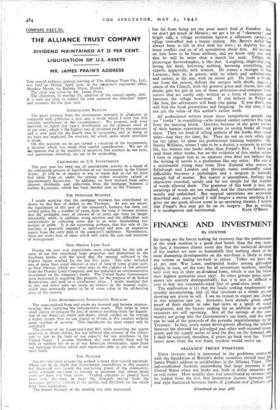COMPANY YEET NG
THE ALLIANCE TRUST COMPANY
DIVIDEND MAINTAINED AT 25 PER CENT.
LIQUIDATION OF U.S. ASSETS MR. JAMES PRAIN'S ADDRESS
Tug annual ordinary general meeting of The Alliance Trust Co., Ltd., was held on Friday, April 25th, in the company's registered office, Meadow House, 64 Reform Street, Dundee. The chair was taken by Mr. James Prain. The chairman, in moving the adoption of the annual report, said : It is now my duty to submit for your approval the directors' report and accounts for the past year.
SATISFACTORY RESULTS
The gross revenue from the investments amounts to £649,000, as compared with £668,000 a year ago, a result which I trust you will consider satisfactory in the circumstances. We propose, with your approval, to repeat last year's distribution on the ordinary stock of 25 per cent., which is the highest rate of dividend paid by the company and is now paid for the fourth year in succession, and in doing so we have not neglected the reserves, for which again ample provision is made.
On this occasion we do not submit a valuation of the investments, a decision which was made after careful consideration. We are of the opinion that in the majority of securities free markets do not exist, and quotations, therefore, are apt to be misleading.
LIQUIDATION OF U.S. INVESTMENTS
The past year has been one of considerable activity as a result of the continuing process of liquidation of our investments in the United States. It will be of interest to you to know that so far we have had taken from us under the vesting orders securities valued at approximately $4,000,000. In addition, we have realised from sales, interest, dividends, and collections from the mortgage business a further $5,000,000, which has been handed over to the Treasury.
THE MORTGAGE BUSINESS
I might mention that the mortgage business has contributed its shares to this flow of dollars to the Treasury. As you are aware, the liquidation of this part of the company's business has been our settled policy for a number of years, from the time it became evident that the profitable rates of interest of 5o years ago were no longer obtainable, while, in addition, rising taxation and the difficulties and uncertainties in collecting sums due to us were diminishing our margin of profit. It is not surprising, perhaps, that this side of the business is generally regarded as moribund and now an expensive legacy from the early days of the company's existence. Nevertheless, there are assets here of value which well repay the care and attention of management.
NEW MEXICO LAND SALE
During the past year negotiations were concluded for the sale of some of our few remaining large properties and plantations in the Southern States, with the result that the amount collected is the highest figure reached for the last five years. The sales included one of more than usual interest—a tract of land of some 47,00o acres in New Mexico, which was taken over in the eighties of last century from the Dundee Land Company, and has remained an unremunerative investment on the company's books. The United States Government were interested in acquiring this property for the purpose of an Indian Reservation, and paid us a satisfactory price. I might mention that in this and other sales we retain an interest in the mineral rights, which may eventually prove to be of some value in the oil-bearing parts of the country.
LESS REMUNERATIVE INVESTMENTS REPLACED
The sums realised from real estate are invested and become revenue- bearing, thus replacing less remunerative assets. This helps in some small degree to mitigate the loss of revenue resulting from the liquida- tion of our American stocks and shares, which yielded on the average a higher return than we can expect to obtain in this country without some sacrifice of security. This liquidation we must expect will be continued.
The passing of the Lease-and-Lend Bill, while removing the urgent necessity to obtain dollars, has not relieved this country of the obliga- tion to pay to the limit of our capacity for our purchases in the United States. I assume, therefore, that very shortly there will be little or nothing left to us of our American investments, apart from our mortgage business which now represents only 51 per cent. of our total funds.
THE OUTLOOK
For this and other reasons the outlook is more than usually uncertain. There can be no doubt that Government expenditure in this country has increased very largely the purchasing power of the community, whlle adequate measures to prevent or postpone that power being eNerc;sed have i-It been taken. Trading concerns in general have been ab!e, ti-elefore, to meet the demands arising from the increased spend'r a, capacity of the public, and dividends on the whole have been maintained.
The formal business of the meeting was duly transacted.






























 Previous page
Previous page